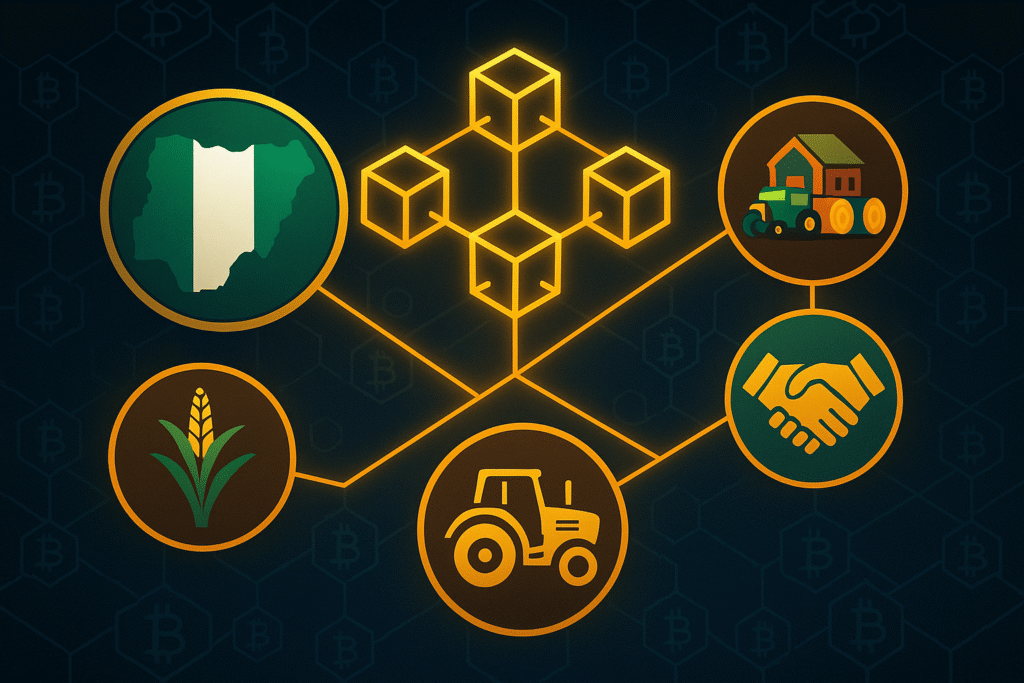In Nigeria, agriculture is more than just a means of survival—it’s a cultural pillar and an economic lifeline.
Yet, for decades, the sector has been plagued by problems that stifle growth: middlemen exploitation, post-harvest losses, fraud, lack of access to finance, and opacity in supply chains.
But what if we told you there’s a technology that can restore trust, eliminate corruption, and empower Nigerian farmers—right from the soil to the shelf?
That technology is blockchain.
And it’s not just hype anymore. Blockchain is quietly, but powerfully, transforming the way Nigerian farmers grow, distribute, and sell their produce—with transparency as the new currency of trust.
Table of Contents
So, What is Blockchain?
Think of blockchain as a digital ledger that records every transaction in a way that cannot be altered or erased. Each transaction (or “block”) is linked to the previous one, forming a secure, transparent chain of data that everyone can see, but no one can secretly tamper with.
In agriculture, this means that from planting seeds to selling harvests, every step can be recorded and verified—making the entire system trustworthy and corruption-resistant.
Real Applications of Blockchain in Nigerian Agriculture
Here’s how blockchain is already making waves across Nigeria’s farmlands:
1. Transparent Supply Chains
With blockchain, you can trace a yam from a farm in Benue to a plate in Lagos. Each transaction—who handled it, where it went, what condition it was in—is recorded. This boosts food safety and consumer trust, especially in export markets.
Case in Point:
The International Institute of Tropical Agriculture (IITA) is piloting blockchain systems to track crops like cassava and yams, making farm-to-fork transparency possible.
2. Smart Contracts = Fair Deals for Farmers
Blockchain-powered smart contracts automatically release payments once certain conditions are met—like the delivery of a specified quantity and quality of produce. No more delayed payments or broken promises from middlemen or buyers.
🚜 Farmers get paid faster.
💸 Buyers get what they ordered.
🤝 No third-party drama.
3. Access to Finance Through Tokenization
Many Nigerian farmers struggle to get loans. Why? No collateral, no credit history, and little trust from banks.
But blockchain solves this with invoice tokenization and digital identities. Farmers can convert unpaid invoices into digital assets and use them to secure funding.
🔥 Innovation Alert:
A Nigerian blockchain startup, Terarchy, allows farmers to tokenize invoices for instant liquidity—no banks, no stress.
4. Blockchain Insurance That Actually Pays
What happens when rain fails or floods destroy a farm? Traditional insurance systems are slow and often unreliable.
But with blockchain-based crop insurance, smart contracts trigger automatic payouts based on weather data from IoT sensors—no need for manual claims or back-and-forth.
That means faster relief and less risk for farmers.
5. Land Ownership Without Drama
Land disputes are one of the biggest headaches in Nigerian agriculture. Blockchain creates a tamper-proof digital registry of land titles, helping farmers prove ownership and access land-related benefits like loans and grants.
Nigerian Projects Leading the Way
Several innovative projects are already bridging the gap between blockchain theory and farm-level impact:
Coscharis Farms in Anambra is using blockchain to power a smart rice farming ecosystem—giving farmers access to land, tools, and real-time data for better yields.
Agbatoken by the Nigerian Farmers Group & Cooperative Society allows farmers to tokenize their assets (like land and produce) to raise capital without giving up ownership.
Terarchy is helping small-scale farmers access funding by converting their invoices into digital tokens—cutting out loan sharks and long bank processes.
But Challenges Remain
Internet access in rural areas is still poor.
Digital literacy among farmers needs massive improvement.
Policy support from the government is still evolving.
Scalability needs to be addressed to make blockchain solutions affordable and widespread.
The Future is Transparent
Blockchain won’t solve all of Nigeria’s agricultural problems overnight—but it’s a giant leap forward.
By ensuring every transaction is trackable, every payment is fair, and every farmer is seen, blockchain is laying the groundwork for a food system that is not only efficient but equitable.
In a country where over 70% of the population is involved in agriculture, the impact of blockchain goes beyond farms—it’s a national development strategy.
CONCLUSION
If Nigeria is going to feed itself—and the world—while protecting its farmers and building trust across its food system, blockchain is not optional. It’s inevitable.
The seeds of the future have been planted.
Now, it’s time to harvest transparency.
Want to stay ahead in agricultural innovation?
Follow the latest blockchain projects and support local initiatives driving change in Nigeria’s farmlands. The future is being written—block by block.


